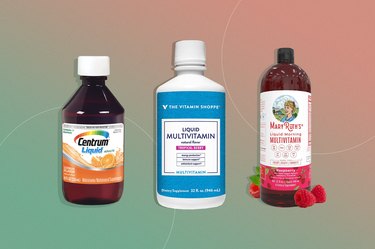
You try to do the right thing to round out your nutrition by taking a multivitamin every day. Then, ugh: Your acid reflux symptoms emerge again. You wonder, can multivitamins worsen acid reflux — or is something else triggering those symptoms?
As it turns out, your multivitamin pill may indeed make acid reflux worse, but so can other types of supplements, says Carl V. Crawford, MD, a medical expert for Drugwatch and an assistant professor of medicine and attending physician at the New York Presbyterian-Weill Cornell Medical Center in the Division of Gastroenterology and Hepatology in New York City.
Video of the Day
Video of the Day
A Refresher on Acid Reflux
Acid reflux is also called heartburn and is a symptom of GERD, which is short for gastroesophageal reflux disease. It happens when acid in your stomach goes back up toward the esophagus, which connects your throat and stomach.
With acid reflux, a valve in your esophagus doesn't close as it should. That causes the sour taste typically associated with acid reflux, according to the Cleveland Clinic. Other symptoms include a sore throat, problems swallowing and a cough.
Although most of us experience acid reflux at some point in our lives, it's considered GERD if it occurs regularly a few times each week, Dr. Crawford says. More than 60 million Americans experience heartburn each month, per the American College of Gastroenterology.
Can Multivitamins Cause Acid Reflux?
Multivitamins do not cause acid reflux, but they can irritate your symptoms if you're already prone to heartburn, Dr. Crawford says. That's because there are certain components of multivitamins, such as iron and potassium, that are known to trigger acid reflux symptoms, he says.
Additionally, if you have acid reflux, a wide variety of pills and supplements may cause heartburn and related symptoms, according to the Mayo Clinic. The ones most likely to irritate the esophagus include:
- Antibiotics
- Bisphosphonates, which help to strengthen bones
- Iron supplements
- Pain relievers, such as aspirin and ibuprofen
- Potassium supplements
There's another group of medications known to make acid reflux worse, per the Mayo Clinic. Those include:
- Anticholinergics, a type of medicine used for overactive bladder and irritable bowel syndrome
- Certain medications used for heart disease and high blood pressure, including calcium channel blockers, statins, angiotensin-converting enzyme inhibitors and nitrates
- Narcotics such as codeine
- Sedatives
- Tranquilizers
- Tricyclic antidepressants
What to Do if Your Multi Causes Reflux
Here are a few ways to cope if you find that your daily multivitamin irritates your acid reflux:
1. Assess Your Diet
Talk to your doctor about whether or not you really need a multivitamin. You should aim to get your nutrients from a healthy balanced diet instead of relying on supplements, Dr. Crawford says.
In fact, some health experts question the value of multivitamins. Large studies have found they were not associated with reduced risk for cancer, heart disease or cognitive decline, according to Johns Hopkins Medicine.
Although some population groups may need a multivitamin, many health experts would rather you instead focus on eating more fruits and vegetables, whole grains, low-fat dairy and protein sources, per Johns Hopkins Medicine.
2. Try a Liquid or Chewable Form
If you and your doctor determine you would benefit from taking a multivitamin, these forms may be gentler on your insides, Dr. Crawford says.
3. Check In About Your Symptoms
Talk to your doctor if you have new acid reflux symptoms that continue for more than two weeks, Dr. Crawford says.
You should also check in with your doctor if you're using acid-reducing medication for two weeks or more and you don't have diagnosed acid reflux. It's important to rule out other potential causes of your acid reflux symptoms, such as inflammation of the esophagus or a narrowing of the esophagus, he says.
- American College of Gastroenterology: “Acid Reflux”
- Carl V. Crawford, MD, medical expert for Drugwatch, assistant professor of medicine and attending physician at the New York Presbyterian-Weill Cornell Medical Center in the Division of Gastroenterology and Hepatology, New York, New York
- Cleveland Clinic: “GERD (Chronic Acid Reflux)”
- Johns Hopkins Medicine: “Is There Really Any Benefit to Multivitamins?”
- Mayo Clinic: “GERD: Can Certain Medications Make It Worse?”
Is this an emergency? If you are experiencing serious medical symptoms, please see the National Library of Medicine’s list of signs you need emergency medical attention or call 911.


